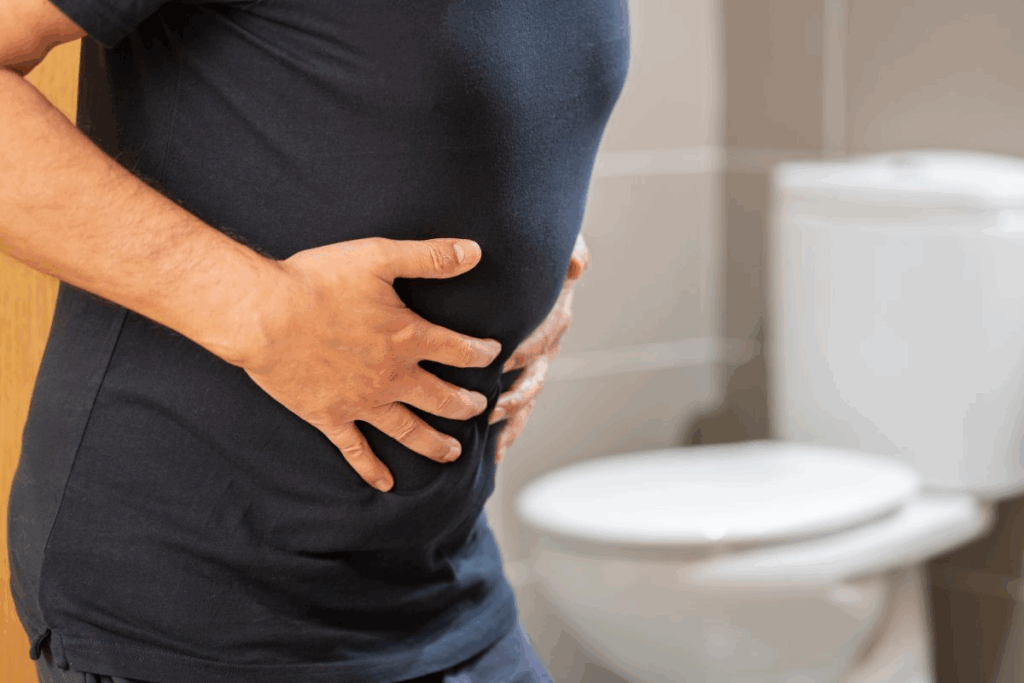Last Updated on November 26, 2025 by Bilal Hasdemir

Hernias happen when tissue or organs push through weak spots in the belly wall. They can show up in the groin, navel, or upper stomach. The most common sign is a soft swelling or bulge under the skin. Where the bulge appears depends on the hernia type.Understand can a hernia cause diarrhea, symptoms, and digestive issues linked to hernias.
There are many types of hernias, like inguinal, femoral, umbilical, incisional, hiatal, epigastric, and Spigelian. Each can cause different symptoms and problems. Knowing how these hernias affect digestion, like causing diarrhea, is important for treatment.

A hernia happens when an organ or tissue bulges through a weak spot in the muscle or fascia. This can cause pain and discomfort, affecting your life quality. Knowing what causes hernias and who is at risk is key to managing them.
A hernia is when an organ or tissue pushes through a weak spot in the muscle or fascia. This usually happens in the abdominal area. Hernias are classified based on where they occur and how they bulge.
Hernias often come from weakened muscles or fascia. Factors like increased abdominal pressure, previous surgeries, and strain on the abdominal wall can cause them. Activities like heavy lifting, chronic coughing, or obesity also play a role.
Several factors can make you more likely to get a hernia. Age, obesity, smoking, and a family history of hernias are some. Conditions like chronic constipation or prostate issues also increase the risk.
| Risk Factor | Description | Impact on Hernia Development |
| Age | Increased age | Higher risk due to muscle weakening |
| Obesity | Excess body weight | Increased pressure on abdominal wall |
| Smoking | Chronic coughing | Increased abdominal pressure |
| Family History | Genetic predisposition | Higher likelihood of hernia occurrence |
Knowing about these risk factors and causes helps prevent and detect hernias early. By managing these factors, you can lower your chance of getting a hernia and its complications.

The human body has weak spots where hernias can happen, mainly in the abdominal wall. Knowing these weak spots helps us understand how hernias form and where they usually appear.
The abdominal wall has layers of muscles and fascia. These layers support and protect our internal organs. But, some areas are more likely to be weak because of different reasons, like:
Tissue protrusion happens when there’s a gap or weakness in the abdominal wall’s muscles or fascia. This lets internal organs or tissue bulge out, making a hernia. Things that can cause this include:
Hernias can pop up in different spots, like:
Knowing these common spots and the body’s anatomy helps us spot and deal with hernias better.
It’s important to know about the different hernias to spot symptoms early. Hernias are grouped by where they happen and why. This means each type needs its own treatment plan.
Inguinal hernias are the most common. They happen when tissue bulges through a weak spot in the abdominal muscles in the groin. Men are more likely to get them because of how their reproductive system develops.
Key characteristics of inguinal hernias include:
Femoral hernias are less common but can be tricky to diagnose. They happen when tissue pushes through the wall of the femoral canal, near the groin.
Femoral hernias are more common in women and carry a higher risk of complications. This is because of their location and the narrowness of the femoral canal.
Umbilical hernias occur around the navel and are common in babies. In adults, they can be caused by strain or weak abdominal muscles.
Characteristics include:
Incisional hernias happen through a scar or incision in the abdominal wall. They are more common in patients with weakened abdominal walls or those who have had multiple surgeries.
Each hernia type has its own risk factors and complications. Knowing these differences is key to managing and treating them effectively.
Hiatal hernias are different from other hernias because they happen in the diaphragm. This can cause various digestive problems. A hiatal hernia occurs when the stomach bulges through a hole in the diaphragm. The diaphragm is the muscle that separates the chest from the belly.
Hiatal hernias are unique because they affect the diaphragm, not the abdominal wall. This location can cause symptoms like heartburn, acid reflux, and sometimes diarrhea. Unlike other hernias, hiatal hernias involve the diaphragm.
The way hiatal hernias happen is also different. It’s due to weak diaphragm muscles around the esophageal hiatus. This allows the stomach to bulge into the chest. This can mess up the lower esophageal sphincter (LES), leading to GERD symptoms.
Hiatal hernias and GERD are closely linked. When the stomach bulges into the chest, it can weaken the LES. This makes it easier for stomach acid to flow back into the esophagus. This can cause heartburn, regurgitation, and sometimes diarrhea.
“The presence of a hiatal hernia can significantly alter the anatomy and function of the gastroesophageal junction, predisposing individuals to GERD.”
Many people with GERD also have a hiatal hernia. This shows a strong connection between the two conditions.
Hiatal hernias can mess with digestion in several ways. They can slow down how food moves through the stomach. This can lead to symptoms like bloating, nausea, and changes in bowel habits, including diarrhea.
Treating hiatal hernias can be complex. It may involve changing your lifestyle, taking medication, or even surgery.
To understand if hernias can cause diarrhea, we need to look at different types of hernias and their effects. Most hernias don’t usually cause diarrhea. But, hiatal hernias and large or trapped hernias might lead to stomach problems.
Hernias can affect how our bowels work in several ways. For example, hiatal hernias can mess with the lower esophageal sphincter. This might cause symptoms like GERD, which can change how we go to the bathroom.
Large hernias or those that get stuck can also put pressure on our intestines. This can change how we have bowel movements.
The mechanical pressure from a hernia can mess with our bowel function. This is true for hernias in the abdominal wall. They can press on or squeeze intestinal loops.
Hernias can also cause secondary problems that might lead to diarrhea. For instance, the pain from a hernia can make us eat differently or stress more. This can affect our bowel habits. Also, fixing a hernia can sometimes lead to complications that mess with our bowels.
Incarceration, when a hernia gets stuck and can’t go back in, is a serious issue. It can cause bowel obstruction and severe stomach symptoms, like diarrhea.
Studies have shown that some hernias are linked to stomach problems. Hiatal hernias, for example, increase the risk of GERD. This can sometimes lead to changes in bowel habits. Large or complex hernias are more likely to cause serious stomach symptoms because of their size and possible complications.
Research on the relationship between hernia types and stomach symptoms is ongoing. It shows how important it is to consider hernia diagnosis in people with unexplained diarrhea or bowel changes.
Hernia complications can seriously harm your digestive health. They can cause symptoms like diarrhea, stomach pain, and nausea.
Incarceration happens when tissue bulging through a hernia gets stuck. It can’t go back into the belly. This can cause bowel obstruction, leading to stomach pain, nausea, and vomiting. It might also make your stool loose, causing diarrhea.
Strangulation is a serious issue where blood stops flowing to the herniated tissue. It’s a medical emergency that needs quick action. Strangulation can cause gangrene and intestine holes, leading to severe symptoms like diarrhea.
A partial bowel obstruction happens when part of the intestine is blocked. This can occur with incarceration or strangulation. It can change your bowel habits, causing diarrhea or constipation, depending on the blockage’s severity and location.
The link between hernias and digestive symptoms is complex. Knowing about these complications is key for correct diagnosis and treatment. Different kinds of hernias can cause various problems, showing the importance of tailored care.
Hernias with diarrhea need a detailed diagnosis. Getting the diagnosis right is key. It affects how the patient is treated and their outcome.
Checking for hernias starts with a physical exam. Doctors use touch and tenderness checks to find hernias. This exam helps spot a hernia and any problems it might cause.
Palpation means feeling the area with fingers. It looks for bulges or tenderness, signs of a hernia.
Imaging is needed to confirm a diagnosis. Ultrasound, CT scans, and MRI are common. They show the hernia’s size and any issues.
Diarrhea can have many causes. It’s important to rule out other reasons. This ensures the right diagnosis.
“A detailed check is key to find out why someone has diarrhea. It helps spot hernias too.”
Tell your doctor about all symptoms, even unrelated ones like diarrhea. This helps get the right diagnosis and treatment.
Hernias with digestive symptoms need a special treatment plan. The right treatment depends on the hernia type, symptom severity, and overall health.
For some, starting with conservative management is best. This might include:
These steps can manage symptoms well. They’re often enough for mild hernias or those not suited for surgery.
For many, surgery is the best way to treat hernias causing digestive issues. Surgical options include:
Each method has its own benefits. The choice depends on the patient’s condition, the surgeon’s skill, and the hernia’s specifics.
After surgery, it’s important to manage digestive symptoms for a smooth recovery. This may involve:
Understanding long-term outcomes and preventing recurrence are key in hernia management. This includes:
By taking a complete approach to treatment and follow-up, patients can lower recurrence risk and manage digestive symptoms well.
Hernias are a common issue that can affect your digestive health. Different hernias can impact the body in various ways. Sometimes, they can even cause diarrhea.
It’s important to understand how hernias and digestive symptoms are connected. This knowledge helps in managing and treating the condition effectively.
The chance of a hernia causing diarrhea depends on several factors. For example, hiatal hernias can lead to digestive problems because of their location. Knowing the signs of hernias and their complications is key to getting the right medical help.
Being aware and educated about hernias and diarrhea is vital. This knowledge helps individuals manage their condition better. It also improves their overall quality of life.
Effective treatment and management of hernias can greatly reduce the risk of digestive symptoms like diarrhea. This approach is essential for better health.
Hiatal hernias often cause digestive issues like diarrhea. This is because they affect the stomach and esophagus.
Hernias themselves don’t directly cause diarrhea. But, they can lead to conditions that affect bowel function and cause stomach problems.
There are several types of hernias. These include inguinal, femoral, umbilical, incisional, and hiatal hernias. Each has its own characteristics and risks.
Hiatal hernias happen when the stomach bulges into the chest. This is different from other hernias that occur in the abdominal wall.
Yes, hernias can cause many stomach problems. These include abdominal pain, nausea, vomiting, and changes in bowel habits. The symptoms depend on the type and complications of the hernia.
Hiatal hernias are closely linked to GERD. The herniation can disrupt the lower esophageal sphincter. This leads to acid reflux and related symptoms.
Diagnosing hernias with diarrhea involves a physical exam and imaging studies. Ultrasound or CT scans are often used. It also involves ruling out other causes of symptoms.
Treatment options vary. They range from conservative management to surgical repair. The choice depends on the hernia type, symptom severity, and complications.
Some hernias can be managed without surgery. Lifestyle changes and monitoring are often enough. But, surgery is usually needed for severe symptoms or complications.
Complications like incarceration, strangulation, and partial bowel obstruction can occur. These can affect stool consistency and overall stomach health.
Preventing hernia recurrence involves following post-operative instructions. It also means maintaining a healthy weight, avoiding heavy lifting, and managing abdominal pressure factors.
Subscribe to our e-newsletter to stay informed about the latest innovations in the world of health and exclusive offers!